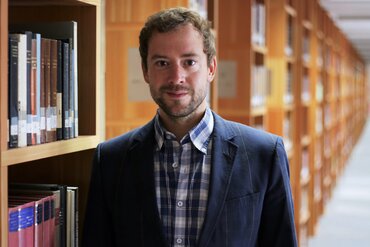Christian Loos
Department of Medical Ethics and History of Medicine

Christian Loos
Georg-August-Universität
University Medical Center Göttingen
Department of Medical Ethics and History of Medicine
Humboldtallee 36
37073 Göttingen
Christian Loos is a philosopher and ethicist at the Institute for Ethics and History of Medicine at Göttingen University Medical Center. In his work, he combines medical ethics issues with philosophical-anthropological and institutional ethics perspectives. His particular focus is on the responsible design of technology-mediated care—e.g., using AI or robotics—and participatory decision-making processes in medicine and nursing. His research encompasses both patient-related settings and institutional and social contexts, for example with regard to epistemic justice, physical vulnerability, and ethical reflection on institutional roles.
Research
- Medical ethics
- Philosophical anthropology of physicality, vulnerability, and neediness
- Ethics in social work
- Technology, environmental, and sustainability ethics
- Institutional and organizational ethics
- Participatory research and ethical policy consulting
Research projects
NaMeKI – Sustainable Human-AI Collaboration
As part of the NaMeKI research consortium, we are working on the project “Ethical and privacy-protecting interactions with robots” to address the question of how robotic assistance systems in care can be designed in an ethically responsible manner. Privacy concerns are a frequently cited reason for rejecting such technologies in care practice. We therefore want to examine the normative basis of these concerns more closely, for example in relation to autonomy, dignity, trust, and the protection of social interactions. We are conducting empirical case studies from the perspective of patients, professional caregivers, and relatives in order to record and analyze the influence of selected factors on ethical assessments, both qualitatively and quantitatively. In addition, we want to translate the moral attitudes of those affected into practical ethical evaluation criteria. Building on this, we are developing technological solutions in interdisciplinary collaboration with computer science that specifically take into account ethically relevant requirements of care practice in a participatory and iterative process. The approaches developed will be evaluated with special consideration given to the diversity of the participants.
PPPI – Participation of patients, parents, and the public
As a cooperation partner in the PPPI part, we are researching at the DZKJ site in Göttingen how young people with and without experience of illness, as well as parents of patients, experience and evaluate participation, empowerment, and involvement in biomedical research. The focus is on research processes related to degenerative neurological diseases. Using case vignettes, we conduct individual interviews and focus groups with affected individuals in order to incorporate their attitudes, experiences, evaluations, and practical ethical considerations into future research and participation designs. Our approach combines empirically gained moral perspectives with normative reflection in order to develop fair, understandable, and context-sensitive participation formats for young people and their families.
Consulting & Moderation
I provide ethical consulting and moderation services at the interface between science, politics, and civil society—particularly in socially controversial and technology-related areas of conflict (including ethical consulting for BGZ and BASE, participation in dialogue formats on Asse II, moderation of citizen forums in the TRANSENS project, organization and implementation of workshops on care ethics and the energy transition).
CV
- 01.05.2022 - 31.03.2025
Wiss. Mitarbeiter im Projekt TRANSENS (Transdisziplinäre Forschung zur Entsorgung hochradioaktiver Abfälle in Deutschland) im Teilprojekt DIPRO (Dialoge und Prozessgestaltung in Wechselwirkung von Recht, Gerechtigkeit und Governance) am Lehrstuhl „Philosophie und Ethik der Umwelt“ Prof. Dr. Konrad Ott an der Christian-Albrechts-Universität zu Kiel. - Seit 01.04.2017
Promotionsstudium in der Philosophie an der Westfälischen Wilhelms-Universität Münster. Betreut von Herrn PD. Dr. Andreas Vieth und Herrn Prof. Dr. Dres. h.c. Michal Quante. Arbeitstitel: Ludwig und Friedrich Feuerbach. Eine kritisch-reflexive Anthropologie einer „neuen“ Leiblichkeit. - 01.09.2021 – 31.12.2024
Bildungsreferent im Demokratieprojekt „Grauzone: historisch-politische Extremismusprävention zum völkisch-nationalistischen Milieu“ im Auftrag des Hessischen Ministeriums des Innern und für Sport umgesetzt von der Jugendbildungsstätte Ludwigstein in Witzenhausen. - 01.03.2021 – 28.02.2022
Verwaltung einer Professur an der Hochschule Hannover in der Fakultät V – Diakonie, Gesundheit und Soziales – in einem Umfang von 50% einer Vollzeitprofessur mit 9 LVS. - 01.01.2021 – 31.12.2021
Gastwissenschaftler am Forschungsinstitut für Philosophie Hannover (fiph). - 01.10.2019 – 31.08.2021
Wiss. Mitarbeiter im Projekt „Energieverantwortung“ am Philosophischen Seminar Lehrstuhl Prof. Dr. Dres. h.c. Michael Quante der Westfälischen Wilhelms-Universität Münster. - 01.04.2019 – 31.12.2019
Wiss. Mitarbeiter im Kopernikusprojekt (BMBF) „Energiewende Navigationssystem (ENavi)“ am Philosophischen Seminar Lehrstuhl Prof. Dr. Dres. h.c. Michael Quante der Westfälischen Wilhelms-Universität Münster. Verantwortlich für das Kriterium „Ethische Akzeptabilität“ im Rahmen des Arbeitspakets „Multikriterielle Bewertungsverfahren“. - 01.10.2018 – 31.12.2020
Fellow am Forschungsinstitut für Philosophie Hannover (fiph) Gerberstraße 26, 30169 Hannover im Rahmen eines Stipendiums der CIVITAS (Gesellschaft zur Förderung von Wissenschaft und Kunst e.V.). - 1. Staatsexamen in den Fächern Philosophie, Geschichte, Deutsch und Erziehungswissenschaft
You might also be interested in